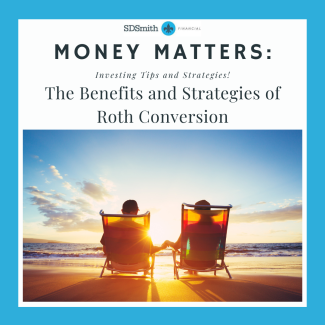
Money Matters Weekly: The Benefits and Strategies of Roth Conversions
Retirement is a milestone that brings both excitement and a need for careful financial planning. One strategy that has gained popularity among retirees and financial advisors is the Roth conversion. Understanding the benefits and intricacies of Roth conversions can help you make informed decisions that maximize your retirement savings and reduce tax liabilities.
What is a Roth Conversion?
A Roth conversion involves transferring funds from a traditional IRA or 401(k) into a Roth IRA. Unlike traditional retirement accounts, which are funded with pre-tax dollars and taxed upon withdrawal, Roth IRAs are funded with after-tax dollars and offer tax-free withdrawals. This strategic move can provide significant tax advantages and increase your financial flexibility in retirement.
Key Benefits of Roth Conversions
- Tax-Free Withdrawals: One of the most appealing benefits of a Roth IRA is that qualified withdrawals are completely tax-free. This can be particularly advantageous if you anticipate being in a higher tax bracket in the future or if you want to minimize your taxable income in retirement.
- No Required Minimum Distributions (RMDs): Traditional IRAs and 401(k)s require you to start taking RMDs at age 73 (changing to 75 in 2033), which can increase your taxable income. Roth IRAs, on the other hand, have no RMDs during the account holder's lifetime, allowing your investments to grow tax-free for a longer period.
- Estate Planning Benefits: Roth IRAs can be an excellent tool for estate planning. Since Roth accounts do not have RMDs, you can leave the account to your heirs, who can then benefit from tax-free growth and withdrawals.
- Flexibility in Retirement: By having a mix of traditional and Roth accounts, you gain more flexibility in managing your taxable income. In years when your taxable income is high, you can withdraw from your Roth IRA to avoid pushing yourself into a higher tax bracket.
When to Consider a Roth Conversion
- Low-Income Years: If you anticipate lower income in certain years, such as early retirement or a sabbatical, it might be an opportune time to perform a Roth conversion. The lower your income, the lower the tax rate you’ll pay on the converted amount.
- Anticipating Tax Increases: If you expect that tax rates will rise in the future, converting to a Roth IRA now can lock in the current lower tax rates.
- Legacy Planning: If leaving a tax-free inheritance is a priority, Roth conversions can be a valuable part of your estate planning strategy.
Potential Drawbacks and Considerations
- Immediate Tax Liability: Converting funds from a traditional IRA or 401(k) to a Roth IRA triggers a taxable event. You’ll need to pay taxes on the converted amount in the year of the conversion, which can be a significant cost.
- Impact on Medicare and Social Security: A large Roth conversion can increase your taxable income, potentially affecting your Medicare premiums and the taxation of your Social Security benefits.
- Timing and Strategy: Deciding when and how much to convert requires careful planning. Converting too much in one year can push you into a higher tax bracket, negating some of the tax benefits.
Steps to Implement a Roth Conversion
- Consult a Financial Advisor: Before making any conversions, it's crucial to consult with a financial advisor who can help you assess your individual situation and develop a strategy tailored to your needs.
- Calculate the Tax Impact: Determine how much tax you will owe on the converted amount and ensure you have the funds available to pay the tax liability without dipping into your retirement savings.
- Plan Incremental Conversions: Consider spreading your conversions over several years to avoid significant tax spikes and to stay within a favorable tax bracket.
- Monitor Legislative Changes: Keep an eye on tax laws and regulations, as changes can impact the advantages of Roth conversions.
Roth conversions can be a powerful tool for optimizing your retirement strategy, offering tax-free growth, no RMDs, and estate planning benefits. However, they require careful planning and consideration of your overall financial picture. By understanding the benefits and potential drawbacks, and by consulting with a financial advisor (Appointment Link Here), you can make informed decisions that enhance your retirement security and financial flexibility.
For more investment topics and strategies, check out our upcoming webinar “Essential Investment Concepts” on July 24th or July 25th.

